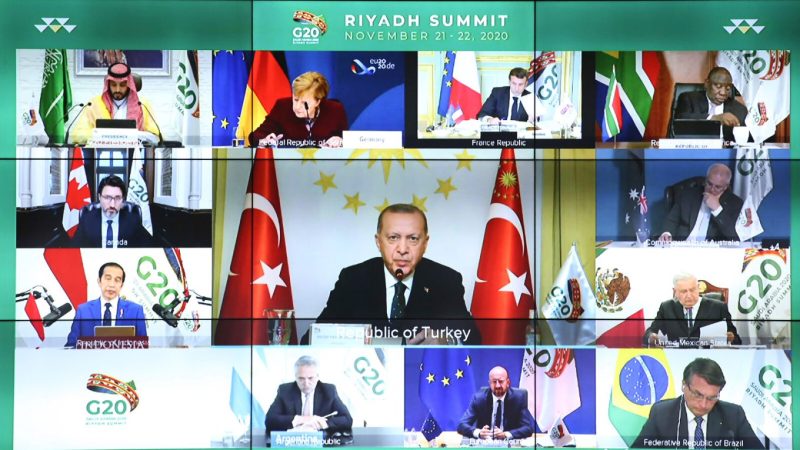W20 Welcomes G20 Leaders’ Recognition of Women as Key Drivers of Economic Growth and the Call for Action to Empower Women and Girls

Categories :
In response to the G20 Leaders’ Declaration, the Women 20 (W20), the non-governmental women’s engagement group to the G20, welcomes the G20 leaders’ commitment to lead the world “in shaping a strong, sustainable, balanced and inclusive post-COVID-19 era,” which specifically recognizes the critical role for women and girls in rebuilding our economies.
The W20, recognizing the many pressing concerns before G20 leaders, especially during this global pandemic, is committed to supporting G20 members to achieve our mutual goals for an equitable, sustainable, balanced, and inclusive recovery from the health, social, and economic crisis the world is currently facing due to COVID-19.
The W20 welcomes the G20 Leaders’ Declaration that specifically addresses women:
Women’s Empowerment: As many women have been disproportionately affected by the crisis, we will work to ensure that the pandemic does not widen gender inequalities and undermine the progress made in recent decades. Recalling relevant UN declarations, processes, and calls to action to empower women and girls, we reaffirm the importance of women’s and girls’ empowerment as a cross-cutting issue in all aspects of our policies and recognize that women are a key driver of economic growth. We will continue to promote gender equality, as well as combat stereotypes, reduce pay gaps, and address the unequal distribution of unpaid work and care responsibilities between men and women. We will step up our efforts towards achieving the Brisbane Goal to reduce the gap in labor force participation between men and women by 25 percent by 2025 along with improving the quality of women’s employment; we call on ILO and OECD to continue providing input to support our progress; and look forward to a roadmap under the next Presidency. We will take steps to remove the barriers to women’s economic participation and entrepreneurship. We welcome the commencement, under the Saudi Presidency, of the Private Sector Alliance for the Empowerment and Progression of Women’s Economic Representation (EMPOWER) for women’s advancement in leadership positions.
The specific recognition of “the importance of protecting and promoting decent jobs for all, especially for women and youth” and of supporting “access to comprehensive, robust, and adaptive social protection for all, including those in the informal economy” is critical for ensuring the conscious and planned inclusion of women in the economy. Likewise, the endorsement of the G20 High-level Policy Guidelines on Digital Financial Inclusion for Youth, Women, and SMEs prepared by the Global Partnership for Financial Inclusion (GPFI) is key for inclusive economic growth.
The W20 is encouraged by the G20 leaders’ call on the ILO and the OECD to continue providing technical input to support monitoring G20 progress on women’s empowerment, as called for the W20 Communiqué, and the call for the Italian Presidency to lay out a roadmap for action. Recognizing the importance of collecting sex-disaggregated data and of establishing mechanisms to track G20 gender policy commitments, the Saudi Arabian W20 Presidency, in consultation with the OECD, has initiated work on a G20 gender policy tracker: Monitoring G20 commitments on gender equality and women’s empowerment. The W20 is confident that this will be an important contribution to the G20 Italian Presidency roadmap and beyond.
“Twenty-five years after world leaders gathered in Beijing to agree on the most progressive blueprint ever for advancing women's rights, the Beijing Declaration and Platform for Action, G20 leaders must continue to diligently work toward closing the gaps that prevent gender equity at the national level,” said Dr. Thoraya Obaid, W20 Chair, recalling a previous W20 statement.
As a number of the W20 Communiqué policy recommendations are reflected in the Leaders’ Declaration, the W20 calls on G20 members to implement these recommendations at the national level. The policy recommendations included in the W20 Communiqué provide a starting point and a framework for change, but immediate action must be taken to translate the recommendations into policies on the ground in each and every country.
“Gender parity is still an aspiration, not a reality. The COVID-19 pandemic has only heightened the need to expedite measures to promote women’s economic empowerment as a means of accelerating recovery to alleviate the adverse effects of the pandemic,” said Dr. Obaid.
“Our work is far from done. In the months and years ahead, we must keep women at the forefront in all decision-making and diligently continue our collective efforts to close the gaps that prevent gender equity.”
Citiesabc was created by a team of global industry leaders, academics and experts to create new solutions, resources, rankings and connections for the world’s top cities and populations.










